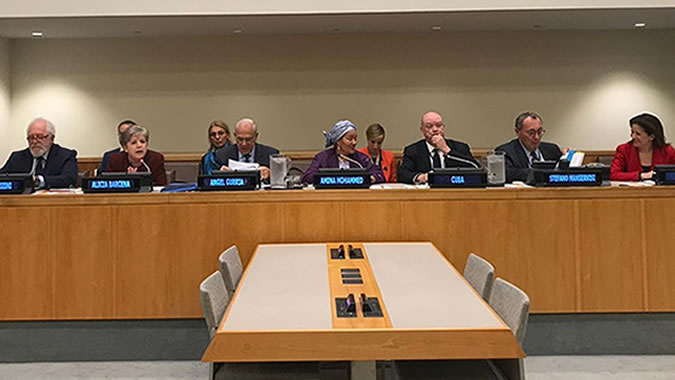International Cooperation Requires a New Narrative that Fully Includes Middle-Income Countries in Order to Achieve the 2030 Agenda
In the framework of the United Nations General Assembly that is taking place in New York, ECLAC’s Executive Secretary, Alicia Bárcena; the European Commission’s Director-General for International Cooperation and Development, Stefano Manservisi; the Secretary-General of the OECD, Ángel Gurría; and the Director of that organization’s Development Centre, Mario Pezzini, presented an innovative proposal to advance development cooperation.

Development in transition fosters new forms of international cooperation that go well beyond financial aid and Official Development Assistance (ODA) and entail coordinated efforts at a national, regional and international level, Alicia Bárcena, the Executive Secretary of the Economic Commission for Latin America and the Caribbean (ECLAC), said today at a high-level event on the sidelines of the UN General Assembly, which is being held this week in New York.
The event “Emerging Challenges and Shifting Paradigms: New Perspectives on International Co-operation for Development” – organized by ECLAC, the European Union and the Development Centre of the Organisation for Economic Co-operation and Development (OECD) – promoted a high-level debate on evolving concepts regarding development cooperation, with an emphasis on the emerging concept of “development in transition.”
The meeting was inaugurated by Amina Mohammed, UN Deputy Secretary-General; Alicia Bárcena, ECLAC’s Executive Secretary; Angel Gurría, Secretary-General of the OECD; and Stefano Manservisi, the European Commission’s Director-General for International Cooperation and Development.
Additional participants included Mario Pezzini, Director of the OECD Development Centre; Rodrigo Malmierca, the Minister of Foreign Trade and Foreign Investment of Cuba, in that country’s capacity as president of ECLAC; and Ambassador Mónica Aspe, the Permanent Representative of Mexico to the OECD.
Subsequently, ECLAC’s Executive Secretary, on behalf of the five United Nations regional commissions, spoke at a high-level meeting on Financing the 2030 Agenda for Sustainable Development, where she called for changing the conversation between the government, the market and society.
In her first remarks, Alicia Bárcena participated on the panel “Rethinking international development co-operation to leave no-one behind,” where she emphasized that development in transition represents a concrete multilateral effort to make progress and act on implementation of the 2030 Agenda.
“Development in transition, with its focus on rethinking international development cooperation as something that goes beyond income and mere financial aid schemes, goes hand in hand with the idea of the development of societies, while at the same time remaining tightly focused on developing countries and their diverse needs,” ECLAC’s Executive Secretary sustained.
She added that the 2030 Agenda can neither be achieved in an isolated way, nor by simply improving financial aid. In this context, development in transition represents an irresistible opportunity to move forward on attaining the Sustainable Development Goals (SDGs), she indicated.
In the framework of the meeting, ECLAC and the OECD Development Centre presented the document Emerging challenges and shifting paradigms: New perspectives on international cooperation for development, which poses a timely debate on how to ensure that international relations be more relevant, receptive and suited to the aim of “leaving no one behind.”
The concept of development in transition has special importance for Latin America and the Caribbean, a region in which the majority of countries are achieving higher income levels but continue to confront structural challenges. These challenges are primarily related to inequalities, regional differences, the mobilization of domestic resources and the weakness of social frameworks, as well as to limited capacities for innovation and low levels of diversification.
In that context, last May the European Union, the OECD Development Centre and ECLAC launched the “Facility for Development in Transition,” a tool that seeks to promote sustainable development in Latin America and the Caribbean as countries make the transition to more elevated income levels.
In the afternoon, Alicia Bárcena spoke at the high-level meeting on Financing the 2030 Agenda for Sustainable Development, which was inaugurated by António Guterres, the United Nations Secretary-General, and Christine Lagarde, Managing Director of the International Monetary Fund.
Other prominent speakers included high-ranking authorities such as Justin Trudeau, the Prime Minister of Canada, and Paul Kagame, the President of Rwanda, among other heads of State, as well as prominent figures from the private sector, including Bill Gates, co-founder of the Bill & Melinda Gates Foundation.
During her remarks in the framework of the panel “Mobilizing private investment for sustainable development,” ECLAC’s Executive Secretary urged for jointly creating a new narrative on development and financing.
“We need more interaction so that together we can change the narrative. We need dialogue, and to change the conversation between the government, the market and society,” she affirmed.
Alicia Bárcena highlighted that the countries that make up the regions represented in the five United Nations commissions (Asia and the Pacific, Western Asia, Africa, Latin America and the Caribbean and Europe) have diverse capital flows and sizes.
In that context, she stressed the necessity of finding out what incentives investors need to join the environmental big push.
“Development is graduality, not graduation, it is how we move together and how we forge this public-private alliance,” she concluded.
Related content
Country(ies)
- Latin America and the Caribbean
Contact
Public Information Unit
- prensa@cepal.org
- (56 2) 2210 2040